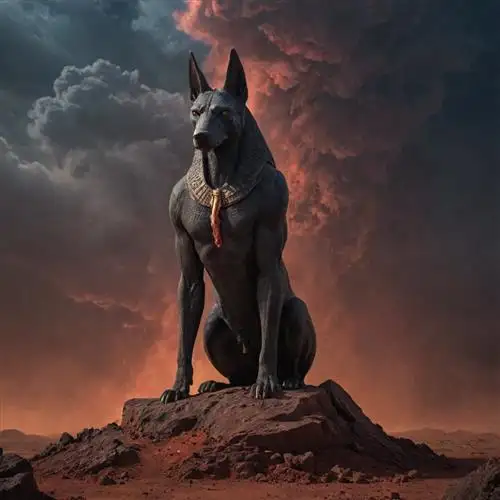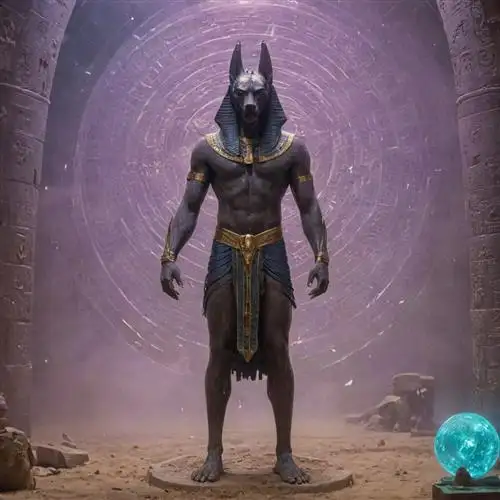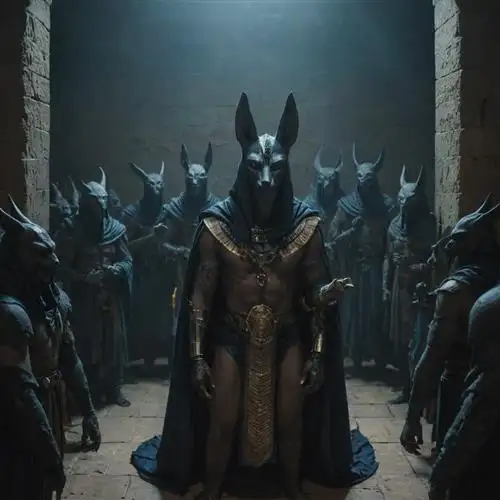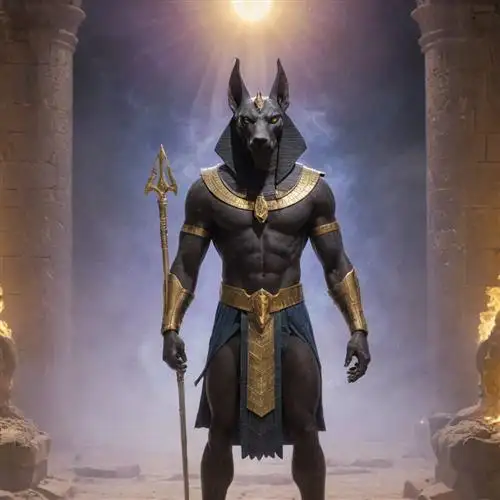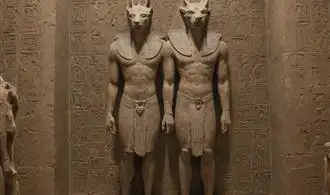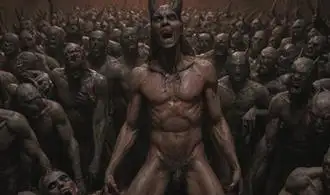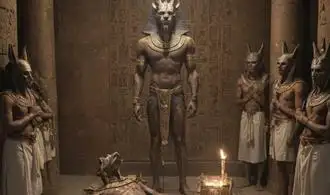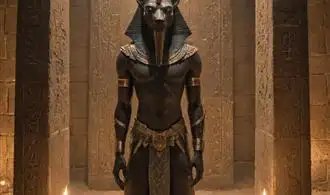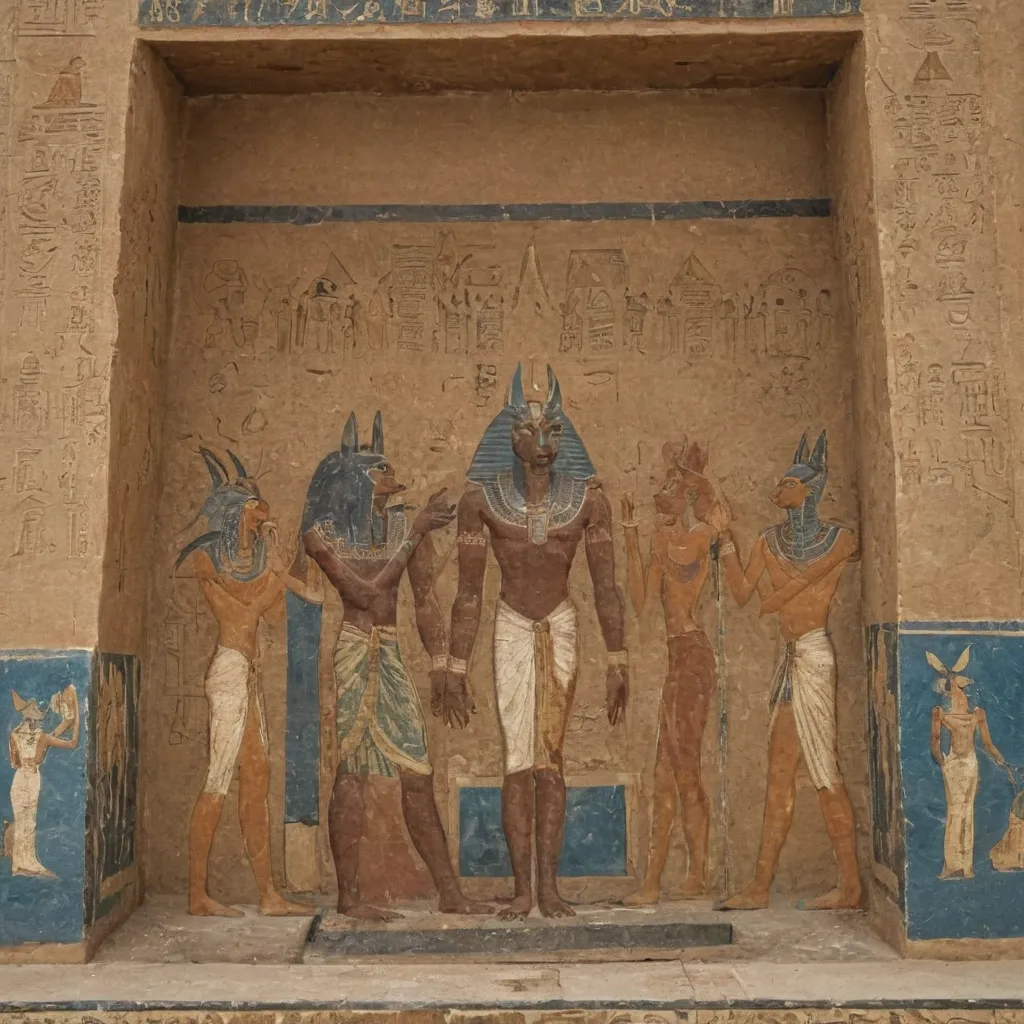
Who is Anubis the Jackal Deity
Anubis, the enigmatic jackal deity, has long captivated the hearts and minds of those seeking divine guidance and protection. As a central figure in ancient Egyptian mythology, Anubis' significance transcends the boundaries of time, holding sway over realms both physical and metaphysical.
At the core of Anubis' identity lies his role as the god of the dead, tasked with the sacred duty of guiding departed souls through the treacherous journey of the afterlife. As the protector of the necropolis and the embalming process, Anubis was revered for his ability to ensure a smooth transition from the mortal plane to the realm of the divine.
Clad in his iconic jackal-headed form, Anubis was believed to possess a deep understanding of the mysteries of death and the cyclical nature of existence. His presence was invoked during funerary rites, where he would weigh the heart of the deceased against the feather of truth, determining their worthiness for the afterlife. This pivotal moment, known as the "Weighing of the Heart," symbolized the delicate balance between one's actions in life and the judgement of the divine.
Beyond his role as the guardian of the dead, Anubis was also celebrated for his protective powers. As the patron deity of embalmers and the necropolis, he was believed to safeguard the sanctity of the burial sites and the transition of the deceased into the afterlife. This association with protection and guidance has led many to seek Anubis' counsel in times of personal crisis or when navigating the complexities of life.
Anubis' iconography, featuring the distinct jackal-headed figure, has become a powerful symbol of his divine authority and the mysteries he represents. The jackal, revered for its keen senses and adaptability, was believed to embody the qualities Anubis possessed – a deep understanding of the realms of the living and the dead, and the ability to navigate the liminal spaces between them.
The Symbolism and Significance of Anubis
Anubis, the ancient Egyptian deity of the dead, holds a profound and multifaceted significance within the rich tapestry of ancient Egyptian mythology. As the jackal-headed god, Anubis was closely associated with the process of mummification, guiding the deceased through the treacherous journey of the afterlife. His role as the gatekeeper to the realm of the dead was integral to the ancient Egyptians' belief system, ensuring the safe passage of the soul from this world to the next.
At the core of Anubis' symbolism lies the jackal, a creature that was once revered for its keen senses and ability to navigate the boundary between the living and the dead. The jackal's association with Anubis reflects the god's role as the protector of the necropolis, the sacred resting place of the deceased. Anubis was responsible for the embalming and preparation of the body, ensuring that the deceased was ready to embark on their journey to the afterlife.
The significance of Anubis extends beyond his role as the guardian of the dead. He was also seen as a deity of rebirth and regeneration, symbolizing the cyclical nature of life and death. The ancient Egyptians believed that Anubis' presence during the mummification process was crucial in preserving the physical form of the deceased, allowing their spirit to be reborn in the afterlife.
In addition to his funerary responsibilities, Anubis was also believed to be a deity of justice and judgment. He was responsible for weighing the heart of the deceased against the feather of Maat, the goddess of truth and order. This process, known as the "Weighing of the Heart," determined the fate of the soul, ensuring that only the righteous could proceed to the afterlife.
The iconography associated with Anubis further reinforces his multifaceted significance. Depictions of Anubis often show him with a jackal head and a human body, sometimes holding the crook and flail, symbols of royal authority. These visual representations highlight Anubis' dual role as both a funerary deity and a keeper of justice and order.
The veneration of Anubis was widespread throughout ancient Egypt, with numerous temples and shrines dedicated to the deity. His importance was further cemented in the pantheon of Egyptian gods, as he was often depicted in close association with other significant deities, such as Osiris, the god of the underworld, and Isis, the goddess of magic and healing.
Rituals and Invocations to Invoke Anubis
Invoking the Anubis deity for guidance and protection requires a deep understanding of the ancient Egyptian god's symbolism and ritual practices. Anubis, the jackal-headed god, is the patron of the dead, the embalmer, and the guide of souls to the afterlife. As such, the rituals and invocations to call upon Anubis must be approached with reverence and care.
One of the most fundamental aspects of invoking Anubis is the creation of a sacred space. This can be done by cleansing the ritual area, lighting candles or incense, and setting up an altar with symbols of Anubis, such as a statue, image, or the color black. The altar should also include offerings, such as black candles, myrrh, or other items associated with the deity.
When performing the invocation, it is crucial to focus the mind and heart on the energy and essence of Anubis. This can be achieved through meditation, chanting, or reciting specific prayers or incantations. Some examples of invocations to Anubis include:
- "Hail Anubis, lord of the dead, guide of the souls, protector of the afterlife. I call upon you to lend your wisdom and guidance in this time of need."
- "Anubis, jackal-headed god, I offer these gifts to you in reverence. Bestow upon me your discernment, your vigilance, and your protection as I navigate the mysteries of the underworld."
- "Anubis, overseer of the embalming and the funerary rites, I beseech you to watch over me and those I hold dear. Grant us safe passage through the realms of the dead, and lead us to the eternal rest we seek."
It is important to note that the invocation should be tailored to the individual's specific needs and intentions. The tone and language used should reflect the practitioner's personal connection and relationship with Anubis.
In addition to verbal invocations, there are other rituals and practices that can be used to invoke Anubis. These may include the creation of an Anubis-focused talisman or amulet, the performance of guided meditations or visualizations, or the incorporation of Anubis-related symbols and imagery into one's spiritual practices.
The Benefits of Connecting with Anubis
Anubis, the ancient Egyptian deity associated with mummification and the afterlife, holds a significant place in many spiritual and esoteric traditions. Connecting with Anubis can offer a wealth of benefits for those seeking guidance, protection, and a deeper understanding of the mysteries of death and transformation. Here are some of the key advantages of forging a relationship with this powerful deity.
First and foremost, Anubis is known as a guardian and protector, particularly during the transition from life to death. By invoking Anubis, individuals can seek his assistance in navigating the challenges and uncertainties of this profound journey. Anubis can provide a steadfast presence, offering comfort, strength, and a sense of security during times of loss, grief, or personal transformation.
Additionally, Anubis is deeply connected to the process of mummification and the preservation of the physical body. For those interested in spiritual and metaphysical practices, Anubis can serve as a guide in the process of self-transformation and the shedding of old, limiting beliefs or behaviors. By connecting with Anubis, individuals can tap into the energy of rebirth, renewal, and the ability to shed the old to make way for the new.
Anubis is also revered for his role as a psychopomp, or a guide of souls. Those seeking clarity, guidance, or insight into the mysteries of the afterlife may find solace and wisdom in petitioning Anubis. Through dreams, visions, or direct communication, Anubis can offer valuable perspectives and advice on navigating the realms beyond the physical world.
Furthermore, Anubis is associated with the protection of the deceased and the preservation of their legacy. By invoking Anubis, individuals can seek his aid in honoring and preserving the memory of their ancestors or loved ones who have passed on. This can be particularly beneficial for those seeking to connect with their family lineage or to honor the traditions and wisdom of their cultural heritage.
Anubis in Ancient Egyptian Mythology
Anubis, the iconic jackal-headed deity, holds a revered place in the pantheon of ancient Egyptian mythology. This enigmatic figure was deeply intertwined with the rituals and beliefs surrounding death, mummification, and the afterlife. As the god of embalming and the protector of the dead, Anubis played a crucial role in guiding the souls of the deceased through the treacherous journey to the afterlife.
In the ancient Egyptian belief system, Anubis was responsible for overseeing the mummification process, ensuring the proper preservation and preparation of the deceased for their eternal journey. The jackal-headed deity was believed to be present at the moment of death, ready to receive the soul and guide it through the crucial weighing of the heart ceremony. This ritual, depicted in the famous Book of the Dead, determined the worthiness of the individual's soul, ultimately deciding their fate in the afterlife.
Anubis was also revered as the guardian of cemeteries and the protector of the dead. The ancient Egyptians believed that Anubis watched over the deceased, ensuring their safe passage to the afterlife and protecting their physical remains from harm or desecration. This reverence for Anubis extended to the physical representation of the deity, as the jackal was a sacred animal that was often mummified and interred alongside the human remains.
Beyond his role in the afterlife, Anubis was also associated with the broader concepts of transformation, regeneration, and the cycle of life and death. His connection to the jackal, a scavenger that thrives in the liminal spaces between the living and the dead, further reinforced his position as a mediator between the mortal and divine realms.

